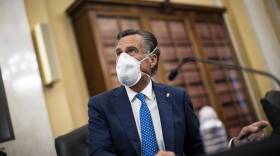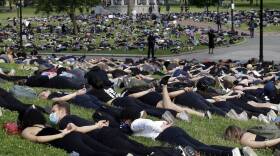EXPLORE MORE
Coming up Friday on BPR, live from the BPL:
Live Music Friday: Juliet Lloyd
Former Boston mayor Kim Janey, the NAACP’s Michael Curry, and Ted Landsmark
Jenny Johnson and Billy Costa on their new cookbook
Gold Dust Orphans mastermind Ryan Landry
Recent segments
-
Social Justice Vs. Social Distance? Art Caplan Says We Can 'Walk And Chew Gum' At The Same Time
Protests are a health risk amid COVID-19, but there are steps people can take to be safer about it. -
Village Voice: Poems For A Potential Turning Point In America's Relationship With Race
'Today we're taking a closer look than we have in a long time,' at racism in America, poet Richard Blanco said. -
Kayyem: Support From Sen. Romney Shows How ’Successful’ And ’Tactical’ Black Lives Matter Protests Have Become
The former Massachusetts governor said that George Floyd's death was "a heinous murder carried out by a person with a badge." -
Ryan Landry Weighs In On Confederate Statues: 'Cut His Head Off And Leave the Horse'
The Gold Dust Orphans theater company founder said it was important that Americans remember their country's racist legacy. -
Deval Patrick: White Allies To People Of Color Should 'Let Your Guard Down, Open Your Heart, And Listen.'
Demonstrations against police brutality are beginning to coalesce around a platform of policies. Is this a turning point in America? -
Charlie Sennott: For Both Protesters and Trump, Current U.S. Moment Hints at 'Tipping Point'
The GroundTruth Project CEO said there's credence to concerns the president is slipping into authoritarianism.
Listen to previous shows
-

BPR Full Show: Will He or Won't He?
Today on Boston Public Radio: We begin the show by asking listeners whether or not they think Donald Trump will run in the 2024 Presidential Election. Trenni Kusnierek updates listeners on the latest sports news, including Jon Gruden’s resignation as coach of the Las Vegas Raiders following the release of homophobic, racist and misogynistic emails, and the FBI’s failure to investigate Larry Nassar. Kusnierek is an anchor and reporter for NBC Sports Boston, as well as a Boston Public Radio contributor. Ali Noorani discusses the scientific achievements of immigrants to the United States amid recent Nobel Prize announcements, and critiques the conditions at the border and treatment of Haitian migrants. Noorani is the President & Chief Executive Officer of the National Immigration Forum. His forthcoming book is Crossing Borders: The Reconciliation of a Nation of Immigrants. Rick Steves reports back from his latest travels to Paris and Mont Blanc, and shares his hopes for his next trip to Europe. Steves is an author, television and radio host and the owner of the Rick Steves' Europe tour group. You can catch his television show, "Rick Steves’ Europe," weeknights at 7:30 p.m. on GBH 2 and his radio show, “Travel With Rick Steves,” Sundays at 4 p.m. on GBH. Revs. Irene Monroe and Emmett G. Price III talk about the significance of Indigenous People’s Day and the effect of Facebook’s outage on religious communities. Monroe is a syndicated religion columnist, the Boston voice for Detour’s African American Heritage Trail and co-host of the All Rev’d Up podcast. Price is the founding pastor of Community of Love Christian Fellowship in Allston, the Inaugural Dean of Africana Studies at Berklee College of Music and co-host of the All Rev’d Up podcast. John King weighs in on the latest political headlines, including Democratic infighting in Washington D.C. and the possibility of Trump running again. King is CNN's Chief National Correspondent and anchor of "Inside Politics,” which airs weekdays and Sunday mornings at 8 a.m. We end the show by continuing the conversation with listeners about the possibility of a Trump 2024 campaign. -

BPR Full Show: Food on Tape
Today on Boston Public Radio we're on tape, replaying some of our favorite conversations about food and cooking: Joanne Chang talks about her latest book inspired by her baking journals, “Pastry Love: A Baker’s Journal of Favorite Recipes.” Chang is a James Beard award winning pastry chef. Bren Smith shares different ways to eat kelp in his book “Eat Like a Fish: My Adventures Farming the Ocean to Fight Climate Change.” Smith is a former commercial fisherman and executive director of the non-profit GreenWave, focused on regenerative farming in water ecosystems. Dolores Huerta talks about why her work as a labor leader for farm workers’ rights remains as relevant today as it was in the 1960s, and about coining the phrase “Sí, se puede.” Huerta is an activist and co-founder of the National Farmworkers Association alongside Cesar Chaves. Andrew Li and Irene Li share food and tips from their latest cookbook, which they wrote with their sister Margaret Li: “Double Awesome Chinese Food: Irresistible and Totally Achievable Recipes from Our Chinese-American Kitchen.” Andrew Li and Irene Li are co-founders of the restaurant Mei Mei, along with their sister Margaret Li. -

BPR Full Show: Senator Elizabeth Warren Calls In
Today on Boston Public Radio: We begin the show by talking with listeners – including Senator Elizabeth Warren – about the country’s child care crisis, as families struggle to pay for care and centers downsize due to lack of staff. Shirley Leung discusses a proposal to house Mass. and Cass’ homeless population in an empty detention center, and the state of fundraising in the mayor’s race. Leung is a business columnist for The Boston Globe and a Boston Public Radio contributor. Callie Crossley talks about Tesla’s $137 million payment to a former Black employee for racial discrimination at work, the quilt exhibit at the Museum of Fine Arts and Georgia’s youngest farmer, a six year old girl. Crossley hosts GBH’s Under the Radar and Basic Black. Sue O’Connell weighs in on the New York Times’ article and subsequent Twitter controversy, “Who is the Bad Art Friend?”, and criticism of Dave Chappelle’s latest Netflix stand-up special. O’Connell is the co-publisher of Bay Windows and the South End News, as well as NECN's political commentator and explainer-in-chief. Andy Ihnatko breaks down Monday’s Facebook outage and the latest criticism facing the company following accusations by whistleblower Frances Haugen. Ihnatko is a tech writer and blogger, posting at Ihnatko.com. We end the show by asking listeners about their experiences with the Boston Marathon, as the race returns this Monday. -

BPR Full Show: A Tough Egg To Crack
Today on Boston Public Radio: Chuck Todd updates listeners on the latest political headlines, including a federal judge siding with the Justice Department to block the restrictive Texas abortion law, current negotiations over a possible debt limit extension and what motivates Senator Kyrsten Sinema. Todd is the moderator of “Meet the Press,” host of “Meet the Press Daily” on MSNBC and the political director for NBC News. Then, we talk with listeners about their thoughts on the early stages of the 2022 Massachusetts Governor race, including Donald Trump’s endorsement of former state Rep. Geoff Diehl. Andrea Cabral talks about the terrible conditions at Rikers Island, and how the Justice Department could be doing more work for police reform. Cabral is the former Suffolk County sheriff and the former Massachusetts secretary of public safety. She is currently the CEO of the cannabis company Ascend. Paul Reville discusses school board fights over mask mandates, and protests against legacy admissions in some of the country’s most elite universities. Reville is the former Massachusetts secretary of education and a professor at Harvard University’s Graduate School of Education, where he also heads the Education Redesign Lab. His latest book, co-authored with Lynne Sacks, is “Collaborative Action for Equity and Opportunity: A Practical Guide for School and Community Leaders.” Dan Carpenter weighs in on why it is taking so long to approve the COVID-19 vaccine for children aged 5-11, as Pfizer officially asks the Food and Drug Administration to issue Emergency Use Authorization. Carpenter is a professor of government at Harvard University, and oversees The FDA Project, a theoretical, historical and statistical analysis of pharmaceutical regulation in the United States as it is carried out by the F.D.A. His most recent book is “Democracy by Petition: Popular Politics in Transformation, 1790-1870.” Corby Kummer talks about the impact of the pandemic on the restaurant industry, Guy Fieri’s latest ventures and changing animal welfare laws that could raise egg prices in Massachusetts. Kummer is the executive director of the Food and Society policy program at the Aspen Institute, a senior editor at The Atlantic and a senior lecturer at the Tufts Friedman School of Nutrition Science and Policy. We end the show by asking listeners their thoughts on the potential for higher egg prices, as laws increasing pen space for hens are set to go into effect on Jan. 1, 2022. -

Corby Kummer: "There's Not Going to Be An Egg Shortage" in Massachusetts
Massachusetts state legislators may revise a 2016 ballot law on animal welfare to prevent a potential statewide egg shortage. Award-winning food writer Corby Kummer joined Boston Public Radio on Thursday to share his thoughts on this, and more. “First of all, there’s not going to be an egg shortage,” Kummer said. “It’s only an economic measure to protect farmers.” While the law also contains enclosure standards for pigs and calves, legislators are concerned with rules on acceptable enclosure space for egg-laying hens. According to the bill, egg-laying hens must be given at least 1.5 square feet of floor space and be able to fully extend both wings without touching the sides of the enclosure. In a measure to counteract the potential egg shortage, lawmakers are attempting to amend the enclosure requirements from 1.5 square feet to 1 square foot, following enclosure laws in other states. Unless legislators pass this amendment, the law will go into effect as written on Jan. 1, 2022. Representatives for egg farmers, supermarkets, and some animal rights activists support changes to the law, noting that vertical or multi-tiered aviary systems that allow hens to fly upwards, perch, and roost within 1 square foot. While Kummer acknowledged that some farmers may struggle economically to adjust enclosure spaces to fit this new rule, he believes that the idea of an egg shortage caused by enclosure regulations is an “excuse.” “This is another way for the industry to protect itself at the expense of animal welfare,” Kummer said. “But, if the country has enacted 1 square foot, then maybe Massachusetts should be consistent with that.” Kummer is the executive director of the Food and Society policy program at the Aspen Institute, a senior editor at The Atlantic and a senior lecturer at the Tufts Friedman School of Nutrition Science and Policy.








